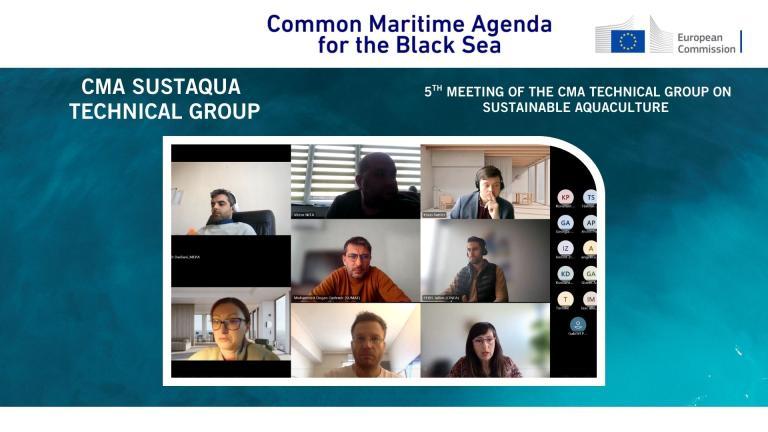The fifth meeting of the CMA’s Technical Group on Sustainable Aquaculture (SustAqua) took place virtually on 27 February 2025, chaired by the Black Sea Assistance Mechanism (BSAM). Participants included representatives from the Energy Transition Partnership (ETP) for EU Fisheries and Aquaculture, the World Bank’s Sustainable Aquaculture Initiative (part of the Blueing the Black Sea (BBSEA) Program), the General Fisheries Commission for the Mediterranean (GFCM), the European Climate, Infrastructure and Environment Executive Agency’s (CINEA) Deputy Unit for Sustainable Blue Economy, and National Hub Experts from the Black Sea region.
During this 5th SustAqua Technical Group meeting, participants provided an overview of the current status of the group, after one year of being operational and since the previous SustAqua Technical Group meeting held on 12 September 2024 in Chișinău, Moldova. Participants were invited to prepare detailed presentations of their strategic objectives and experiences, which led to discussions on major opportunities, research and development, and best practices for enhancement and support for the Black Sea.
The SustAqua Technical Group participants highlighted as key priorities:
Resilience in the aquaculture sector and carbon footprint reduction.
Boosting innovation, such as introducing macroalgae aquaculture and integrated multi-trophic aquaculture techniques.
Improving data collection and sharing.
Coordinating monitoring systems for aquaculture activities.
Legislative harmonisation.
Capacity building for scaling up and knowledge transfer, complemented by private sector involvement.
Promotion of pilot projects and workshops.
Shaping an open and collaborative monitoring framework for national coordinators and ministries.
Funding and investment mechanisms, including cooperation with existing EU initiatives.
The SustAqua Technical Group participants expressed appreciation for the upcoming efforts and refined priorities, focusing on the monitoring framework programme, environmental impact assessments, and public awareness to boost aquaculture acceptance. The need for continuous dialogue was emphasised, with plans for further meetings in June, September, and December.

